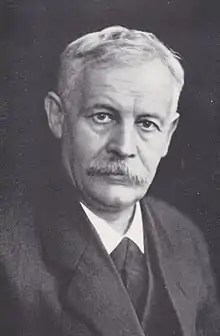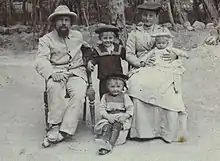August Hermann Francke (Tibetologist)
August Hermann Francke (5 November 1870 in Gnadenfrei, Silesia – 16 February 1930 in Berlin) was a German Tibetologist. He worked in Ladakh and Lahul from 1896 to 1908 and published the Ladakh chronicles (La dvags rgyal rabs) with an English translation. He served as the first professor of Tibetan at the Berlin University.[1]
- To be distinguished from his ancestor of the same name, August Hermann Francke.

Family and early life

Francke's grandfather was Christian Friedrich Francke, a descendant of the 18th-century theologian August Hermann Francke (1663–1727), after whom August was named. He married Anna Theodora Weize (b. 1875 Silo, South Africa) whom he met in Kleinwelka, Saxony. Before they married she went to Amritsar for a year to improve her English as a teacher. August Hermann joined her in India and married her there in 1897.
Career
Francke served as a Moravian Church missionary in Ladakh, a major region of Jammu and Kashmir Province in the Himalayas, from 1896 until 1909. His return to Europe was occasioned by his wife's illness. He was subsequently appointed professor of Tibetan languages at Berlin University.[2][3][4]
After Yoseb Gergan produced the first draft of the Tibetan Bible in 1910, Francke corrected it and then sent it to David Macdonald, the British trade agent in Yatung. Also involved was his Moravian colleague Heinrich Jäschke who produced A Tibetan-English dictionary.
Francke became professor at Berlin and his students included Walter Simon.[5]
Works
- 1901 A Sketch of Ladakhi Grammar Journal of the Royal Asiatic Society of Bengal 70.1
- A history of Western Tibet: one of the unknown empires
- Antiquities of Indian Tibet - Vol. I: Personal Narrative Of A Journey In 1910 From Simla To Srinagar; Through Kinnaur, Spiti And Ladakh. For The Express Purpose Of Investigating The Buddhist Antiquities; Vol. II: The Chronicles Of Ladakh And Minor Chronicles Antiquities of Indian Tibet : vol.1 Antiquities of Indian Tibet : vol.2
- Tibetische Geschichtsforschung und was man dabei erleben kann, 1911
- Tibetan Grammar
- "Historical Documents from the Border of Tibet." In Annual Report of the Archaeological Survey of India 1909–1910. Edited by J. Marshall, Calcutta: Government of India Press, 1914. pp. 104–112.
- “The Tibetan Alphabet.” Epigraphia Indica 11 (1911): 266–273.
- First collection of Tibetan historical inscriptions on rock and stone from Ladakh Himalaya (with Prem Singh Jina). Delhi: Sri Satguru, 2003.
References
- Bray, John, "Recent Research on Ladakh: An Introductory Survey", Himalayan Research Bulletin, 18 (1)
- Alex McKay, The History of Tibet: The modern period: 1895-1959, the encounter, 2003 p. 337:
- Gerald H. Anderson (ed.)Biographical dictionary of Christian missions, 1999 p. 222, sub. Francke, August Hermann (1870-1930).
- Gudrun Meier, 'A.H. Francke- A "Brother in Spirit" to Alexander Csoma de Kôrös,' in Henry Osmaston, Philip Denwood (eds.), Recent research on Ladakh 4 & 5: proceedings of the fourth and fifth international colloquia on Ladakh,Motilal Banarsidass Publ., 1996 pp. 397ff.
- 2007: (Toni Huber and Tina Niermann). "Tibetan Studies at the Berlin University: A Brief Institutional History", In: P. Maurer & P. Schwieger (eds.) Tibetstudien. Festschrift für Dieter Schuh zum 65. Geburtstag. Bonn: Bier'sche Verlagsanstalt, pp.95-122. "Archived copy" (PDF). Archived from the original (PDF) on 2015-07-10. Retrieved 2012-07-08.CS1 maint: archived copy as title (link)